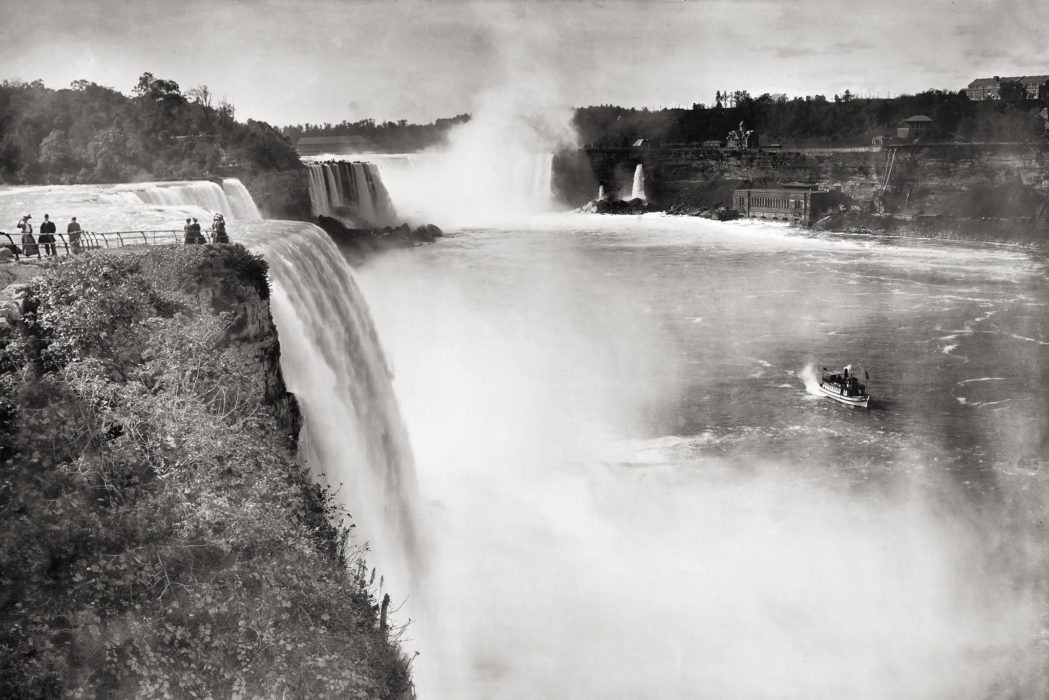FOUR IRANIAN MEN STOOD watching the mighty waters fall, and marveled at the greatness of America. It was Tuesday, September 10, 1912. “The great river feeding the falls,” one of them, Mahmúd-i-Zarqání, wrote, “is flanked on both sides by lakes, fields, mountains and woods. At some places the river falls from a height of a hundred meters. Because of the height of the falls and the crash of the water, small droplets of water form sprays which appear like a great sand storm.”
‘Abdu’l-Bahá, Mahmúd-i-Zarqání, Dr. Ameen Fareed, and Ahmad Sohrab had arrived in Buffalo by train from Montreal at about 11 p.m. the night before, and had taken up residence in suites 118 and 120, on the third floor of the Iroquois Hotel. In the afternoon, after ‘Abdu’l-Bahá gave interviews to the press in his suite, the four men each paid a streetcar fare of fifty cents for the hour-long ride to Niagara Falls.
From a perch engulfed in mist, ‘Abdu’l-Bahá and his secretaries watched the Niagara River thunder over the cliffs into the basin below. ‘Abdu’l-Bahá gazed into the roaring waters for more than half an hour. Ahmad Sohrab wrote that ‘Abdu’l-Bahá found the sight “unsurpassed in beauty and unique in awe inspiring charm.” For a time he sat on the bank of the river eating some grapes and pears. Ahmad Sohrab took the opportunity to write postcards to friends across America, and then the party returned to Buffalo by 8 p.m. After resting in his room for thirty minutes, ‘Abdu’l-Bahá then came downstairs and spoke to a group of about seventy people in the hotel’s ballroom.

The papers of the next morning — September 11, 1912 — printed ‘Abdu’l-Bahá’s verbal assault against the pretexts for war.
“The very cause of life is the Supreme One’s love, for by His grace we move, we see, we hear, we feel, and all phenomena is based on His love. . . . But, alas, the shadow obscuring the sun of affection. Alas, that on earth should breed a contrary spirit in the hearts of men. Alas, hatred and enmity should spring forth to make a hell of war and bloodshed.”
“The continent of Europe is one vast arsenal,” he said, “which only requires one spark at its foundations and the whole of Europe will become a wasted wilderness. And what flimsy, what impudent pretexts they use. Patriotism, say they; glory, say they; the upbuilding of the continent, say they. What a travesty on God’s truth.”
“Therefore,” he told the Americans, “forbid that spark! Pray that this shall not be: that the infernal warfare should be ceased.”
“You who comprise a large and peaceful nation, who are prosperous, who enjoy so just a government, shall try to cease these quarrels among nations, that the factors of tyranny and oppression shall pass away.”
In Washington almost five months ago, ‘Abdu’l-Bahá had called for a “reciprocal alliance” between the United States of America and the nation of Iran, in front of 600 people at the Carnegie Library on Massachusetts Avenue. “May they become one race,” he had said, “endowed with the same susceptibilities.”
The papers on September 11, 1912, reported similar sentiments: “I praise God,” ‘Abdu’l-Bahá told his audience in Buffalo, “for the means afforded to people of the Orient to come to see the people of the Occident, and make known their love for them. I am hopeful that day by day this love will increase.”
At 5:35 a.m. on September 12, ‘Abdu’l-Bahá departed on the train for Chicago, the first leg of a long western trip that would take him to Minneapolis, Denver, Omaha and Lincoln, Nebraska, Salt Lake City, Sacramento, Los Angeles, and San Francisco. He would not return again to New York until November 12, two full months from today.






